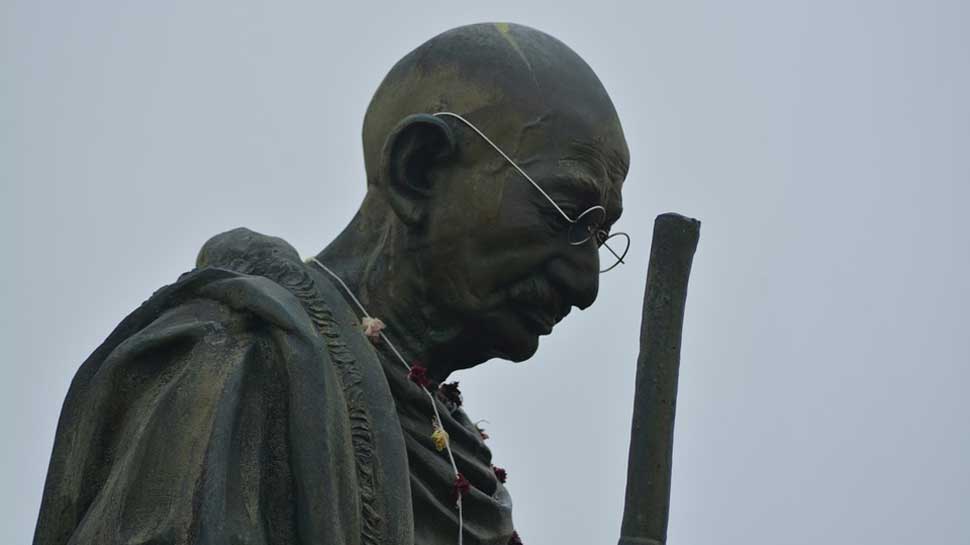By: Dipak Kurmi
Mahatma Gandhi, whose full name was Mohandas Karamchand Gandhi, is one of the greatest figures in Indian and global history. Born on October 2, 1869, in Porbandar, a coastal town in Gujarat, Gandhi grew up in a family where his father, Karamchand Uttamchand Gandhi, served as the Diwan (Prime Minister) of Porbandar. Known as Bapu (Father) by millions, Gandhi’s influence was not limited to India alone but extended across the world. He is remembered not just as a leader of the Indian independence movement, but also as a global icon of peace, non-violence, and truth.
Early Life and Education
Born into a modest family, Gandhi’s upbringing was shaped by religious and cultural values. After completing his matriculation, he traveled to England, where he pursued his law degree and became a barrister. Gandhi’s exposure to Western education broadened his intellectual horizons, but it also deepened his connection to his Indian roots and his passion for justice. After completing his studies, he moved to South Africa, where he first experienced racial discrimination, which profoundly impacted him.
During his two decades in South Africa, Gandhi became a champion of civil rights for the Indian minority, opposing the oppressive apartheid system. It was there that he developed his philosophy of non-violent resistance, which he later termed Satyagraha. This philosophy became central to his work throughout his life and laid the foundation for the Indian freedom struggle.
A Multifaceted Leader
Mahatma Gandhi was not just a political leader; his contributions spanned multiple dimensions. He was a social reformer, a thinker, a spiritual leader, a writer, and an educationist. Gandhi advocated for many causes beyond independence, such as the eradication of untouchability, rural development, and the promotion of handicrafts. His life and work inspired global movements for civil rights and freedom, with prominent leaders like Martin Luther King Jr. drawing inspiration from him.
Despite his significant achievements, Gandhi lived a simple life, adhering to the principles of self-discipline and high thinking. His preference for minimalism became symbolic of his rejection of materialism, and his use of the charkha (spinning wheel) became an emblem of self-reliance.
The Mahatma’s Philosophy: Non-Violence and Satyagraha
Mahatma Gandhi’s greatest contribution to the world was his unwavering commitment to non-violence and truth. For Gandhi, non-violence was not just a strategy but a way of life. He believed that true power comes not from violence but from moral authority. His technique of Satyagraha, or non-violent resistance, sought to convert opponents by appealing to their conscience, relying on the power of truth and righteousness.
Gandhi’s philosophy of non-violence influenced freedom struggles worldwide and continues to resonate with movements advocating for peace and justice. His belief that “there is no good higher than truth” became a cornerstone of his personal and political ideology.
The Indian Independence Movement
Gandhi’s return to India in 1915 marked the beginning of a new era in the Indian freedom struggle. He quickly became the leader of the Indian National Congress, using his philosophy of Satyagraha to rally millions against British rule. Gandhi believed that India’s path to freedom had to be grounded in non-violence and mass participation.
His first major campaign was the Non-Cooperation Movement (1920-1922), which encouraged Indians to boycott British goods and institutions. This movement gave Indians the confidence to stand up to the British Empire peacefully. Following the Non-Cooperation Movement, Gandhi led the Civil Disobedience Movement (1930), which involved non-violent defiance of British laws, most notably the Salt Satyagraha or Dandi March, where he walked 240 miles to protest the British monopoly on salt production.
In 1942, Gandhi launched the Quit India Movement, calling for an end to British rule in India. The movement’s slogan, “Do or Die”, became synonymous with India’s final push for independence. Despite facing imprisonment, Gandhi continued his peaceful agitation until India gained independence on August 15, 1947.
Champion of Social Reform
While leading the freedom struggle, Gandhi was also deeply concerned about India’s social problems. He was a staunch opponent of untouchability and fought to uplift the socially marginalized. He called the untouchables Harijans (children of God) and worked tirelessly to integrate them into society. Gandhi’s efforts contributed to the eventual abolition of untouchability, which was enshrined in India’s constitution under Article 17 and further reinforced by the Protection of Civil Rights Act of 1955.
Gandhi’s vision of an inclusive India extended beyond caste. He believed in Hindu-Muslim unity and secularism. He worked to foster harmony between the two communities, even as the subcontinent headed towards partition in 1947.
An Advocate for Education and Rural Development
Gandhi’s contributions to Indian society went far beyond politics. He was a proponent of basic education and his vision for education, known as Nai Talim, emphasized learning through practical work and self-reliance. He believed in the dignity of labor and advocated for the empowerment of rural communities through education and local industries.
Gandhi was a staunch supporter of Swadeshi, or the use of locally made goods, particularly khadi (handwoven cloth). He believed that promoting village industries would uplift rural India and make the country economically self-sufficient.
Global Influence and Lasting Legacy
Mahatma Gandhi’s ideas had a global impact, influencing leaders and movements around the world. His practice of non-violence inspired prominent civil rights leaders such as Martin Luther King Jr. and Nelson Mandela, who used similar methods to fight racial discrimination in the United States and South Africa, respectively.
Gandhi’s influence also extended to the United Nations, which recognizes October 2nd, his birthday, as the International Day of Non-Violence. This day is observed globally to promote the ideals of peace, tolerance, and understanding.
Personal Life and Philosophy
Though primarily known as a leader of political movements, Gandhi was also a deeply spiritual person. His personal beliefs were shaped by the Bhagavad Gita, which he referred to as his spiritual guide. His philosophy was a unique blend of politics, spirituality, and social reform, which he integrated seamlessly into his life and work.
Gandhi’s advocacy for cleanliness, both in personal hygiene and public sanitation, was also noteworthy. He believed that work is worship and that the service of mankind is service to God. His campaigns for cleanliness and sanitation were ahead of their time and remain relevant in India today.
The Tragic End of a Legend
Despite his lifelong commitment to non-violence, Gandhi’s life was tragically cut short by an act of violence. On January 30, 1948, he was assassinated by Nathuram Godse, a Hindu nationalist who opposed Gandhi’s efforts to reconcile Hindus and Muslims. His death was mourned across the globe, and January 30 is observed as Martyrs’ Day in India.
As Albert Einstein famously remarked, “Generations to come will scarce believe that such a one as this ever in flesh and blood walked upon this Earth.” Gandhi’s death left a void in the world, but his legacy lives on through his teachings and the countless people he inspired.
Mahatma Gandhi was a man of extraordinary vision, who worked tirelessly to build a just, peaceful, and inclusive world. His life was a testament to the power of non-violence and truth. From his campaigns for India’s independence to his advocacy for social reforms and rural development, Gandhi’s influence on the world remains unparalleled. His ideals of non-violence, truth, and equality continue to inspire people around the globe. To honor Gandhi’s legacy, we must strive to build a world based on his values, a world where peace, justice, and human dignity prevail.
(the writer can be reached at dipakkurmiglpltd@gmail.com)





